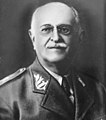President of Brazil - Simple English Wikipedia, the free encyclopedia
| President of the Federative Republic of Brazil Presidente da República Federativa do Brasil | |
|---|---|
 | |
 | |
| Federal government of Brazil | |
| Style | Mr. President[1] His Excellency |
| Status | Head of State Head of Government |
| Member of | Cabinet National Defense Council |
| Residence | Palácio da Alvorada |
| Seat | Brasília |
| Appointer | Direct popular vote (two rounds if necessary) |
| Term length | Four years, renewable once |
| Constituting instrument | Constitution of Brazil |
| Inaugural holder | Deodoro da Fonseca |
| Formation | Proclamation of the Republic 15 November 1889 |
| Deputy | Vice President of Brazil |
| Salary | R$ 402,151 annually[2] |
| Website | www |
The president of Brazil (Portuguese: Presidente do Brasil), officially the president of the Federative Republic of Brazil (Portuguese: Presidente da República Federativa do Brasil) or simply the President of the Republic, is the head of state and head of government of Brazil. The current President is Luiz Inácio Lula da Silva since 2023, who was President of Brazil from 2003 to 2010.
Requirements
[change | change source]The national constitution says that a president be a native-born citizen of Brazil, at least 35 years of age, a resident of Brazil, a registered voter, and a member of a political party.[3]
Terms
[change | change source]The president of Brazil can only be president for a term of four years,[4] and may be re-elected for a second four term.[5] This two-term limit, however, is not for life—a former president who has served for two consecutive terms may run for the presidency again after at least one term has ended.[6]
List
[change | change source]Living former presidents
[change | change source]| Image | Name | Term of office | Age |
|---|---|---|---|
 | José Sarney | 1985–1990 | 94 years, 197 days |
 | Fernando Collor de Mello | 1990–1992 | 75 years, 87 days |
 | Fernando Henrique Cardoso | 1995–2002 | 93 years, 142 days |
 | Dilma Rousseff | 2011–2016 | 76 years, 329 days |
 | Michel Temer | 2016–2018 | 84 years, 45 days |
 | Jair Bolsonaro | 2019–2023 | 69 years, 200 days |
The longest-lived President was Venceslau Brás, who died on May 15 1966 (at the age of 98 years, 78 days).
The most recent President to die was Itamar Franco, who died on July 2, 2011.
References
[change | change source]- ↑ "Decreto nº 9.758, de 11 de abril de 2019" (in Portuguese). Impressa Nacional. 11 April 2019. p. 5. ISSN 1677-7042. Retrieved 4 February 2021.
- ↑ [1] Archived 2021-05-15 at the Wayback Machine, Ministry of Transparency, Supervision and Control. Retrieved on 15 May 2021. (in Portuguese)
- ↑ Constitution of the Federative Republic of Brazil, article 14, paragraph 3.
- ↑ Constitution of the Federative Republic of Brazil, article 82.
- ↑ Constitution of the Federative Republic of Brazil, article 14, paragraph 5.
- ↑ "G1 > Política - NOTÍCIAS - Terceiro mandato é 'legal e constitucional', diz Dirceu". g1.globo.com. Retrieved 3 April 2020.
Other websites
[change | change source]- Official website of the Presidency of the Republic (in Portuguese)


 French
French Deutsch
Deutsch












































